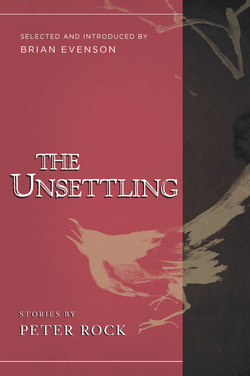Читать книгу The Unsettling - Peter Rock - Страница 6
На сайте Литреса книга снята с продажи.
ОглавлениеINTRODUCTION BY
BRIAN EVENSON
I’ve long had an interest in Peter Rock’s work, though we didn’t actually meet in person until 2014. I first heard of him seventeen years earlier, when a former teacher passed along Rock’s first novel, This Is the Place, to me, along with a note reading, “Hey, you’re from Utah. Is this really what it’s like over there?” That novel, about a lonely aging blackjack dealer in Wendover who becomes obsessed with a young woman from Bountiful, Utah, and about where this obsession leads him, did, surprisingly enough, strike me as being a pretty accurate depiction of the West as I knew it. It illustrated splendidly the sometimes-awkward juxtaposition of different, clashing cultures (Mormons, Basque sheep farmers, Nevada gambling, religious cults, libertarians, etc.) that so characterize the intermountain West and which so few writers actually get right. Rock showed a deep understanding and appreciation of the weirdnesses that seem to accrue in the part of the world we both grew up in.
Rock’s other novels move farther afield. When his second book, Carnival Wolves, was published in 1998, I got asked to review it by Sunstone, a magazine for dissident Mormons, probably because they’d heard it had Mormon polygamists in it. But it doesn’t just have polygamists: it’s a book that operates as a road trip across the country, moving from New York to LA, stopping at a lot of odd places in between—kind of like what Andrei Codrescu’s movie Road Scholar might have been if it was a book and had, in addition to an odd assortment of characters, a plot and a meticulous structure. Other of Rock’s books are set, say, in Philadelphia among seemingly troubled youths, on the streets of Portland, Oregon, in the hidden areas of a nature preserve, or, most recently, in The Shelter Cycle, among the detritus of the collapsed cult known as The Church Universal and Triumphant. But wherever they’re set, we find Rock gravitating toward those voices and bodies that exist along the margins of a given culture. Rock has an intense curiosity about such people, and one of the most remarkable things about his fiction is how nonjudgmental it is. He’s much more interested in understanding why some people take the weird and peculiar paths they end up taking, in elucidating their logic and thinking, than in telling us what we should think of them.
Perhaps the novel is the form that most readily allows for such an exploration, but Rock is an exceptionally able writer of short fiction as well, and I have an especial fondness for his stories. He has only published one collection of short stories, The Unsettling, the book you’re holding now. It contains thirteen stories (only a fraction of the stories that Rock has published in magazines over the years), each of them carefully chosen to resonate in sometimes curious and surprising ways with the others. I find myself not wanting to say much specifically about the individual stories, since I think a good part of their fun is in their particulars, but I will say that the same interest in outsiders figures here as well, the same interest in elucidating a sometimes mad and questionable logic. Indeed, initially you might think that these stories pursue the same project as Rock’s masterful novels. But in the short form, these same concerns lead to something slightly different: reality becomes more deliberately fluid, the fantastic extrudes into the real. Things get strange and even, at times, downright uncanny.
In other words, these are seemingly realistic stories that don’t behave, whose reality begins to seem more and more flexible. They are not unlike the work of Robert Aickman, who wrote marvelous, strange stories that leave you in the end unsettled and wondering what just happened not only to the characters but to you as a reader as well. As so many great stories by the best Japanese writers do, they simply allow for the idea that in certain places the fabric that exists between worlds is frayed and thin, allowing things to leak out or pass through. It’s not that one world is more real than the other. The idea is more that now that one world has leaked into the other, we have a new reality that contains both.
Taken together with Rock’s novels, which are at once so similar and so different both from his stories and from one another, these stories encourage us to think of his work (and of fiction in general) as existing beyond terms such as “realistic” and “fantastic”: the opposition between those two modes just isn’t the point anymore, and if you go into The Unsettling thinking it is, you’re likely to be convinced it isn’t well before you finish. It is a book that teaches you to think about what you read differently, and breaks down the artificial walls critics tend to build around realism. In that sense, The Unsettling strikes me as not only an excellent book but an important one: the stories can be read as taking different paths into and out of realism in a way that deftly marks out a new continuity between the real and the fantastic, a continuity that traces the possibility of a new literary landscape.
—BRIAN EVENSON
